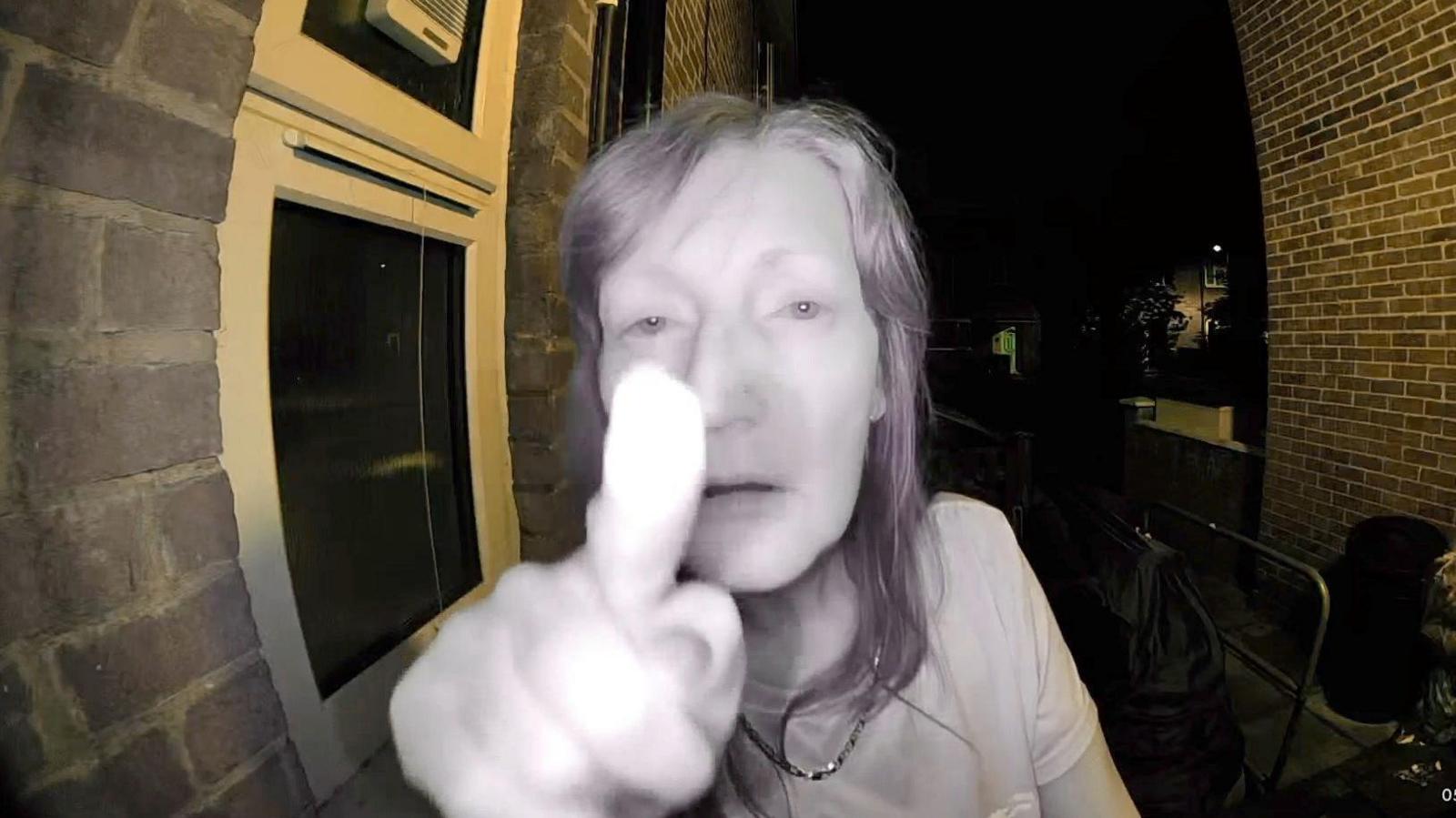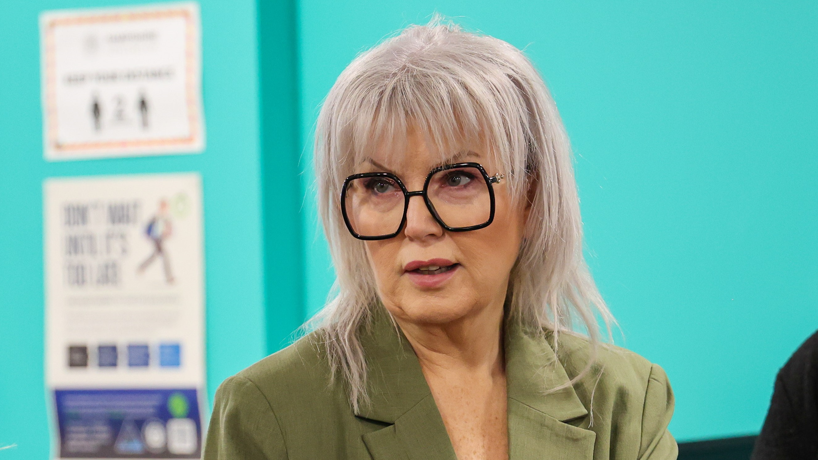'Trapped in our home' - Doorbell camera captures neighbour's abuse and threats
Watch: Doorbell camera footage shows Ben and Emma's neighbour shouting abuse
- Published
It's the early hours of the morning in March 2024 and Ben is woken by shouting and swearing. It's aimed at him, and he says it feels threatening. It's the woman who lives in the flat below.
An hour before, Ben could see and hear threats on the screen of his doorbell camera. It's been rung multiple times and he says he's barely slept.
This is the 78th incident on a meticulous log Ben has been keeping since the anti-social behaviour started about a year before.
He says he's been "abused" and "physically threatened that we would be shot, stabbed and have our knees broken if we leave the house". He says he now lives in a constant state of fear.
Ben bought the ex-council flat in Wandsworth almost three years ago and around six months later, Drina Gray moved into the flat below. He says the issues began soon after.
As well as threats, he says he and his girlfriend Emma are plagued by noise from her flat below, including the tenant's dogs barking, music, shouting and vacuuming all through the night.
He says the disruption even affected his ability to work.
"Because I was so sleep-deprived, I was getting to work quite late. I couldn't focus on my job. Ultimately due to just so much stress, so much anxiety, I lost my job."
Ben eventually got a new job but says he's been left feeling "really helpless" and says the whole experience has had a detrimental impact on his mental health.
Emma adds that she too has been left "terrified".
"We just feel trapped," she says.

Ben and Emma say their neighbour's anti-social behaviour has left them feeling "really helpless"
Ben and Emma are not alone in experiencing anti-social behaviour. According to the latest official data from the Crime Survey for England and Wales, 36% of people experienced or witnessed anti-social behaviour last year, up from 34% the previous year.
Ben is a leaseholder in a council-owned block and says many of his complaints to Wandsworth Council went unanswered.
He says he feels ignored, despite mentioning concerns about mental health and violent threats.
Ben and Emma have called the police to their address more than 20 times and say while local neighbourhood officers have been helpful, they feel failed by the system and "let down" by response times when they call 999.
In August, an official review panel - made up of police and public officials - found there had "not been good communication between agencies" and "none of the agencies has taken ownership of the case".
Wandsworth council has accepted it "could have acted more swiftly."
Ben has now complained to the housing ombudsman.
Over the last year, across the UK, the Housing Ombudsman has ruled that of the 809 anti-social behaviour cases he has presided over, 67% of social landlords hadn't dealt with the issue to an adequate standard.
Richard Blakeway, the Housing Ombudsman, said: "Anti-social behaviour can cause unimaginable distress to people, have a profound impact on the community, and be complex for landlords to manage."
He added that he repeatedly sees cases where "failures prolong issues and leaves residents feeling unheard and continuing to suffer".

Victims' commissioner Baroness Helen Newlove says anti-social behaviour is not being taken seriously enough
The BBC showed some of Ben's footage to Baroness Helen Newlove, the victims' commissioner for England and Wales.
"It shows that the system isn't working, once again, to protect innocent people," she says.
Baroness Newlove's husband Garry died in hospital after being attacked outside his home in Warrington, Cheshire, in August 2007 by three youths after he went to speak to a gang he believed had been vandalising his wife's car.
She says 17 years later, agencies still don't understand the impact anti-social behaviour has on victims. She fears it will take another death for it to be taken more seriously and for it not be treated as "low-level" crime.
She says her inbox is full of complaints from victims about anti-social behaviour.
Baroness Newlove hopes new powers in the Crime and Policing Bill, being drafted this year, will improve protection for victims.
Police to get new powers to tackle anti-social behaviour
- Published22 November 2024
Flats residents 'trapped' by anti-social behaviour
- Published4 February
MPs urge clampdown on tenants' antisocial behaviour
- Published8 January
In December, Ben's neighbour, Drina Gray, pleaded guilty to charges including harassment and criminal damage and will be sentenced in March.
Ben says the anti-social behaviour has continued and Gray has been rearrested multiple times since. She returned to the flat after the first arrest but the BBC understands she is temporarily staying elsewhere as per her bail conditions.
The council says following the court case, it is now seeking possession of the property.
But Ben says he has no idea when Gray will be permanently moved.
In a statement, Wandsworth Council said it "takes criminal and anti-social behaviour very seriously, and we work with partners to both support residents and to take the appropriate action against those responsible.
"This is a complex case where housing officers have been working closely with a number of different agencies, including the Police, to resolve the matter."
A spokesperson for the Met Police said: "Any form of anti-social behaviour is taken seriously and we work in partnership with local authority colleagues to ensure that issues raised are addressed".
Addressing Ben and Emma's specific case, the spokesperson said the police were working to "ensure that the offender is brought before the courts when there is evidence to support it".
The BBC contacted Drina Gray for comment.
Get in touch
Your Voice, Your BBC News: What story do you want BBC News to cover?